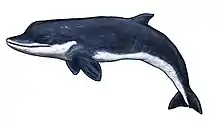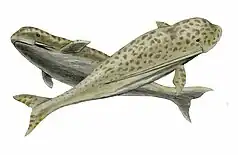| Prosqualodon | |
|---|---|
 | |
| Skull of P. davidis | |
| Scientific classification | |
| Domain: | Eukaryota |
| Kingdom: | Animalia |
| Phylum: | Chordata |
| Class: | Mammalia |
| Order: | Artiodactyla |
| Infraorder: | Cetacea |
| Family: | †Prosqualodontidae |
| Genus: | †Prosqualodon Lydekker, 1894 |
| Species | |
| |
Prosqualodon is an extinct genus of Early to Middle Miocene cetacean from Argentina, Australia, New Zealand and Venezuela.
Description

Prosqualodon was related to and looked like modern toothed whales. It was about 2.3 metres (7.5 ft) long and resembled a dolphin. It had long jaws with interlocking teeth that jutted to the outside, remaining visible when the jaws were closed, like those of a gharial.[1]
In the back of the mouth it had triangular teeth similar to those of earlier cetaceans, but in most other respects, it was relatively advanced. It had developed the body form of modern whales, with a short neck and simple jaw structure, and like modern cetaceans, it also had a blowhole. The olfactory apparatus was reduced compared with earlier forms, suggesting that it had already lost much of its sense of smell, presumably relying on sound to catch its prey.[1]
Species
- Prosqualodon australis Lydekker, 1894 (type); from the early Miocene (Burdigalian) Castillo Formation of Venezuela and the Gaimán and Monte León Formations of Argentina[2]
- Prosqualodon davidis Flynn, 1923; from the early Miocene (Aquitanian) of Tasmania, Australia[3]
- Prosqualodon hamiltoni Benham, 1937; from the late Oligocene (Chattian) of New Zealand;[4] appears to represent distinct genus.[5]
Fossils not assigned to a specific species have also been found in the Calder River Limestone and Jan Juc Formation of Australia.[6]
The nominal species "Prosqualodon" marplesi Dickson, 1964,[7] later treated as a species of the squalodelphinid Notocetus,[8] has been reclassified as a relative of Waipatia and given the new generic name Otekaikea.[9]
References
- 1 2 Palmer, D., ed. (1999). The Marshall Illustrated Encyclopedia of Dinosaurs and Prehistoric Animals. London: Marshall Editions. p. 232. ISBN 1-84028-152-9.
- ↑ R. Lydekker. 1894. Cetacean skulls from Patagonia. Anales del Museo de la Plata II:1-13
- ↑ T. T. Flynn. 1923. A whale of bygone days. Australian Museum Magazine 1:266-272
- ↑ W. B. Benham. 1937. The skull and other parts of the skeleton of Prosqualodon hamiltoni. Transactions of the Royal Society of New Zealand 67(1):8-14
- ↑ Fordyce, R. E., 1978. The morphology and systematics of New Zealand fossil cetacean. Ph.D thesis. University of Canterbury, New Zealand.
- ↑ Prosqualodon at Fossilworks.org
- ↑ M. R. Dickson. 1964. The skull and other remains of Prosqualodon marplesi, a new species of fossil whale. New Zealand Journal of Geology and Geophysics 7:626-635
- ↑ R. E. Fordyce. 1994. Waipatia maerewhenua, New Genus and New Species, Waipatiidae, New Family, an archaic late Oligocene dolphin (Cetacea: Odontoceti: Platanistoidea) from New Zealand. Contributions in Marine Mammal Paleontology Honoring Frank C. Whitmore Jr., Proceedings of the San Diego Society of Natural History 29:147-176
- ↑ Tanaka Y, Fordyce RE (2014) Fossil Dolphin Otekaikea marplesi (Latest Oligocene, New Zealand) Expands the Morphological and Taxonomic Diversity of Oligocene Cetaceans. PLoS ONE 9(9): e107972. doi:10.1371/journal.pone.0107972

